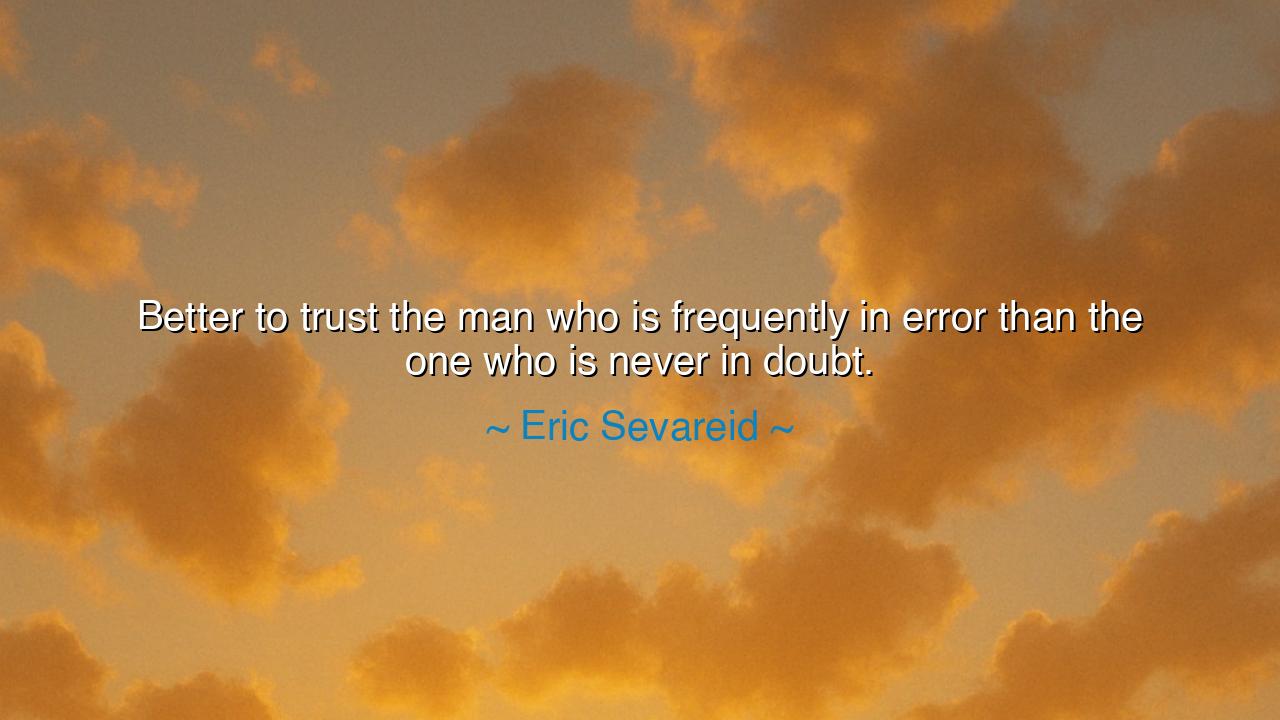
Better to trust the man who is frequently in error than the one






The words of Eric Sevareid—“Better to trust the man who is frequently in error than the one who is never in doubt.”—resound with the weight of paradox, yet within them is wisdom that pierces the heart of human pride. For he reminds us that error is not the greatest danger to the soul, but arrogance. The man who stumbles, acknowledges, and learns may falter often, but he is alive to truth. The man who is never in doubt may appear strong, but his strength is a mask concealing blindness, for he closes himself to growth and hardens his heart against wisdom.
The ancients knew this truth. Socrates, greatest of philosophers, confessed again and again, “I know that I know nothing.” His power lay not in certainty, but in questioning. He erred, as all men do, but his willingness to dwell in doubt made him a seeker of truth, and his legacy has guided minds for millennia. Contrast him with those who believed themselves infallible—tyrants, zealots, false prophets—who, because they doubted nothing, listened to nothing, and led nations into ruin. Thus Sevareid’s words carry the same spirit: the one who errs but doubts is nearer to wisdom than the one who never doubts at all.
History offers striking examples. Consider Christopher Columbus, whose voyages were marked with error after error—misjudged distances, misunderstandings of the lands he reached. Yet, his willingness to venture, to admit uncertainty, to sail into the unknown, opened new worlds. Compare this with leaders of empires who declared themselves invincible, who doubted nothing, and thus marched confidently into disaster. Napoleon, intoxicated with certainty, led his army into the snows of Russia, where doubt might have saved him but pride destroyed him. Here we see it plainly: the erring man may survive and learn, but the man without doubt is destroyed by his own certainty.
The power of Sevareid’s teaching lies in its defense of humility. To be in error is human; to be unwilling to doubt is dangerous. Doubt is the guardian of wisdom, the gate through which correction and growth enter the soul. Without it, one becomes deaf to advice, blind to reality, and enslaved by ego. It is better, then, to walk beside the humble struggler who admits fault than to follow the proud fool who never questions himself. For the struggler will adjust his path; the fool will march off the cliff, dragging others with him.
This teaching applies not only to rulers and explorers, but to each of us in daily life. In our families, friendships, and labors, those who admit error can be trusted, for they show honesty and humility. But beware those who claim always to be right, who never bend, who never confess a fault. Such people may dazzle with their confidence, but they are brittle, and when they break, all around them suffer. To build trust, we must not demand perfection, but sincerity; not infallibility, but the courage to say, “I may be wrong.”
The lesson for us is clear: cultivate the courage of doubt within yourself, and honor it in others. Do not fear error, for error is the schoolmaster of wisdom. Fear instead the arrogance that shuts out correction. Practically, this means listening more than speaking, questioning your own assumptions, and valuing honesty above pride. Trust those who confess their faults, for they are open to learning. Be wary of those who speak as if they are gods, immune to error, for they are the most dangerous of all.
So let Sevareid’s words endure as a guiding torch: “Better to trust the man who is frequently in error than the one who is never in doubt.” For the path of wisdom is not straight, but winding; not free from mistakes, but rich with corrections. Walk with those who doubt, and you will find companions on the road of growth. Follow the man without doubt, and you will find only ruin. Let us then honor humility, embrace doubt, and in doing so, grow toward truth together.






AAdministratorAdministrator
Welcome, honored guests. Please leave a comment, we will respond soon